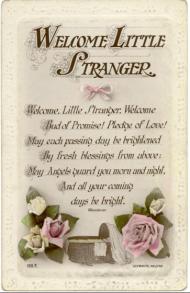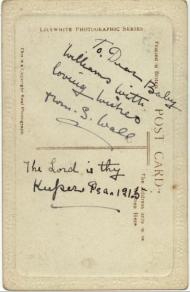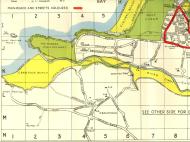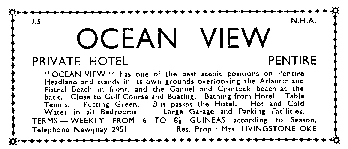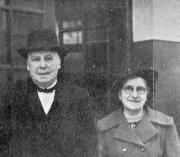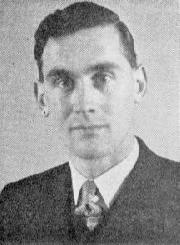1956
WEDNESDAY 1st FEBRUARY 1956
The Bio-Assay LabIt is strange how one develops a sentimental attachment to places and objects. As I left the Bio-Assay Lab for the last time, I felt a real pang of regret, so well had I come to like it. The shelves were bare, the cupboards empty, the floors clear, save for an overflowing waste-paper basket and the front door of the incubator, which had escaped our attention as it reposed against the side of the balance cupboard. The lorry turned up at eleven and we had cleared the lab by midday. |
THURSDAY 2nd FEBRUARY
Writing and broadcastingAn interesting and quite exciting day! This morning I started at Augustus Road, this afternoon I had a letter from Peter inviting me to his wedding, and tonight I broadcast in Town Forum. I travelled on the 8.24 train this morning. We had another very cold night with [some] degrees of frost in Birmingham. The train was late. I travelled with Geoff [Price]. Outside Snow Hill I had to catch the 3A Harborne ’bus, but first of all I went to the Mail and Despatch offices to post my article on National Service, and then to GHB [the General Hospital] to pick up the incubator door, which I had left at the lodge. I arrived at Augustus Road before 9.30 and went upstairs into my new lab. What a contrast to the one we’ve just left! Airy, not too cramped, new benches and cupboards, and a beautiful scene from the window. The lab overlooks the garden and trees and fields beyond, a lovely scene set in the snow. In the trees there were Magpies, Woodpeckers and Grey Squirrels. Frances [Williams] did not arrive for over an hour. Then we brewed some tea and talked until after midday. Frances showed me round the lab and kitchen and took me on a conducted tour of the building. We had a look at the corridor where they had the fire recently. Prof. [Professor Alistair C. Frazer] estimated the damage as £500; probably £1,000 would be a more accurate assessment. Frances recently wrote to Batchelor’s praising their soups, and suggesting they put an Onion Soup on the market. This they have decided to do, so we had a free sample for dinner! We had dinner upstairs in Dorothy Clark’s room. The sight of Frances and me trailing all over the building in stately procession caused some amusement. Dorothy’s room was also occupied by a homing pigeon, which flew in a week ago and has stayed ever since. It is called Scruffy, Charlotte, or any other name deemed suitable for the occasion. In the afternoon a man called to repair the burnt-out oven, so Frances, Roy Hickman and I had to help move it from its confined space between the two doors into the lab. Frances sustained a sizeable blood blister on her finger in the process. We also went down to the kitchen but before we could get at the autoclave and refrigerator, we had to move some of the Bio-Assay equipment [dumped there yesterday]. I made tea in the afternoon and left at nearly twenty past five. Although I missed two ’buses I still got to Snow Hill for 5.35, though the usual train was cancelled and I went home on the 5.50. Ro [Freda’s sister] and Mrs Holloway were also on the train. I called to see Freda on the way home, to say I was taking part in tonight’s Town Forum. I had a ’phone call in the middle of the afternoon to say I had a question placed No. 3 in the programme. The question was: “It has been said that a nation stands or falls by the quality of its women folk. Do the members of the team subscribe to this? Have they any particular observations to make on the women folk of this country?” This was the fifth time I had had a question included in Town Forum. When I got home I found a letter from Peter Shepherd. At first I could place neither the writing nor the name. I hadn’t heard from him since I saw him last in June. He invites me and Dave to his wedding on March 31st, and says we could travel down in his Best Man’s car. Eight months ago Peter hadn’t bought the ring. Perhaps Naomi has taken advantage of its being Leap Year! I caught the ’bus to town just after 7.30pm. Weather conditions were again very bad, it was slightly foggy and I was anxious not to be late. I was inside the Y.M.C.A. Bennett’s Hall in Snow Hill by 8.40pm. Mrs Amy — was again one of the questioners. We seem to have worked a monopoly in the business. There were about 80 empty seats tonight, perhaps because there were no TV cameras. There was a lovely display of flowers round the platform and the whole scene was made the more colourful when the Ven. Mirisse Guna Siri Maha Thero, minister in charge of the London Buddhist Vihara, came onto the platform in brilliant yellow robes. He speaks five and reads in ten European and Eastern languages, and has written several books in English and Sinhalese. Mrs Laurel Casinader, B.Sc.(Econ.) is the President of the Association of Ceylon Women in the U.K.; Sirimevan Amerasinghe is an Advocate of the Supreme Court of Ceylon; Dr. G.C. Mendis is a graduate of London University with honours in History and a Ph.D. Denis Morris was the Chairman. It was a good programme and the questions were well chosen. The P.R.O. Mr F.W. Bradnock and the Editor of the Birmingham Post Mr Vaughan Reynolds selected them. |
FRIDAY 3rd FEBRUARY
|
I went on the 8.26 again this morning, this time with Marjorie Welch. She told me that Pat is now having conversations with Herbert Morrison, who is staying at the same hotel. In the lab I decided to clear out the bookshelves and it looked much tidier afterwards. Whether Frances will be able to find anything now is another matter. Frances herself didn’t appear until well after 11.0am. She stayed until 8.0pm last night so didn’t go to Town Forum (I gave her a ticket). Apart from washing a few tubes, we had little to do all day except get things ready for the Medical Biochemistry students who are coming next week. John Winrow came later in the afternoon. My article on National Service was published today simultaneously in the Birmingham Mail and Evening Despatch. It was the leading article [letter] in the Despatch under the heading “Call-up and Careers.” I missed Freda when I called for her tonight. Choir practice ended early and Mr Lile said that Freda had gone though she was still in church. We eventually found each other at 9.30pm. |
SATURDAY 4th FEBRUARY
|
I missed the 8.26 train, the 8.36 was cancelled, and David Rudge, Ro and I caught the 8.45, which was late. David was catching the 9.0 London train. We got into Snow Hill right on the hour, but his train hadn’t arrived. At work I dusted, tidied a drawer, and left at 12.0 to catch the 12.30. I travelled to town with Mrs Moxon, the cleaner, who told me about her life in the theatre. I spent the afternoon typing. Ro came to borrow my typewriter and we took it in Mam’s basket. Freda and I were going to the Olton to see The Lady and the Tramp but couldn’t get in. We went home and watched TV instead. |
SUNDAY 5th FEBRUARY
|
We had two wonderful services from Rev. W.W. Ensor. Freda didn’t come in the morning as Mrs Powley was unwell. At 4.0pm we discussed our Y.T. (Youth Team) services at South Yardley and Nether Whitacre. We had a play-reading at Y.P.F. |
MONDAY 6th FEBRUARY
No more rugbyAs I had to see Mr Innes [Alexander Innes, M.B.E., F.R.C.S., Old Edwardian] this morning I went on the 8.45 train. I had first of all to buy a card for Freda and her present. I got a card at Stanford and Mann’s [and] bought a French-made pure silk chiffon scarf and two pillow-cases, the latter from Edmund’s in the Great Western Arcade. My appointment with Mr Innes was for 9.45 but it was almost midday when I left the Hospital. Once again I had the students to examine my knee. Mr Innes confirmed that I am suffering from Osteochondritis and said that there was no chance of my ever playing Rugby again. He had hoped that my knee might improve but the only thing to do was to have the op. Mr Innes recommended that I put this off as long as I was able to get around with reasonable comfort, but that I should have the knee X-rayed again in twelve months’ time. |
WEDNESDAY 8th FEBRUARY
|
Today was Freda’s birthday and we had a lovely evening together. |
MONDAY 13th FEBRUARY
|
I went on the 7.56 train with Freda this morning. I had to wait some time for the ’bus and then had to ring for Sandy to open the door. Frances appeared about eleven. In the meantime I wrapped Freda’s Valentine card and wrote a letter to Mr Dibben. I was pretty well occupied for the rest of the day. During the lunch hour I autoclaved some Petrie dishes containing bacteria, and in the afternoon made a 500ml Liver Peptone Broth. I have just realised that I forgot to adjust the pH to 6.8. Snow fell most of the day. At one point this afternoon the sky became so dark that it was impossible to read without a light. The Magpies in the garden uttered a few loud squawks and returned to their roost. The silence was very noticeable — one could only hear the distant rumble of the traffic. On the way home I called at the Post Office where there were big queues of people buying stamps for Valentine cards. The Post Office will probably handle 11,000,000 of these cards tonight. I also went to the Mail office and to the Library. Tonight I have so far written up some notes on Bacteriology. |
THURSDAY 16th FEBRUARY
John BullToday was quite exciting in its way, although nothing much happened at work. During the day it snowed quite heavily again. Prof. wasn’t in so we had his bottle of milk. We had coffee, drinking-chocolate, milk and tea during the day! When I got home there was a letter from John Bull, which is paying me a guinea for my letter on National Service which they are publishing on March 3rd. The Men’s Fellowship met tonight and Rev. G .Ernest Long, resident tutor at Handsworth College [since 1953, after 17 years in India] talked about the work there in training candidates for the Ministry. Jack Taylor asked me to take the Chair, which I did. It was unfortunate that circumstances prevented several from attending. We had only nine of us but Mr Ellis and Mr Dibben made up our number shortly before we closed. Dad came to the meeting. Mr Long’s talk was most interesting and gave us an insight into the very rich spirit of fellowship which evidently exists at Handsworth and the other five colleges. I said in my summing-up that we perhaps took for granted the work of our colleges but that after all they were very much bound up with the future of the Methodist Church, and indeed of Christian witness in this country. But the highlight of the day was at 10.10pm when at the close of the News bulletin we were given the result of the House of Commons division after the debate on capital punishment. It was that the Government motion urging retention of hanging but suggesting changes in the law on murder had been defeated by 293 votes to 262. The amendment calling for legislation to abolish or suspend the death penalty was carried by 292 votes to 246. |
FRIDAY 17th FEBRUARY
|
Today I was alone in the lab. Frances was going down to Banbury and wasn’t coming in. I spent the morning washing up, tidying, polishing, and finishing Peter Cheyney’s Dark Duet during my lunch hour. When I collected my pay I was told that we are to receive a rise of 7/6d soon. This should put up my wage to £6 by August, if I am still in the Department then. I also wrote a letter to Prof. John Winrow ’phoned me early in the afternoon and later I went to the Medical School, principally to return Frances’s library books, but also to see John. >hr> |
MONDAY 30th JULY 1956
...
MONDAY 3rd SEPTEMBER 1956TUESDAY 4th SEPTEMBER 1956
WEDNESDAY 5th SEPTEMBER
THURSDAY 6th SEPTEMBER
FRIDAY 7th SEPTEMBER
SATURDAY 8th SEPTEMBER
SUNDAY 9th SEPTEMBER
MONDAY 10th SEPTEMBERTUESDAY 11th SEPTEMBER...
|
